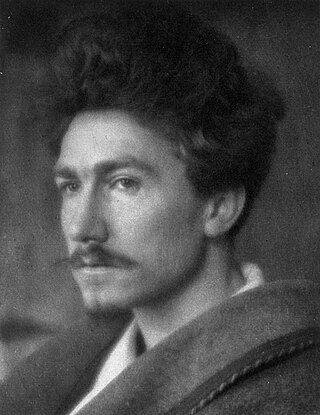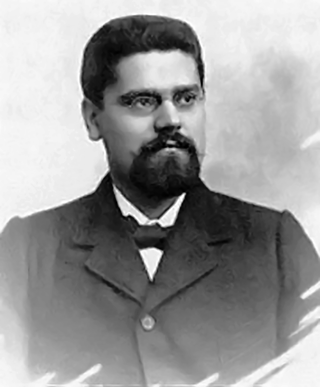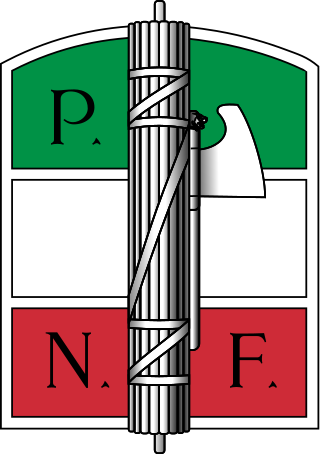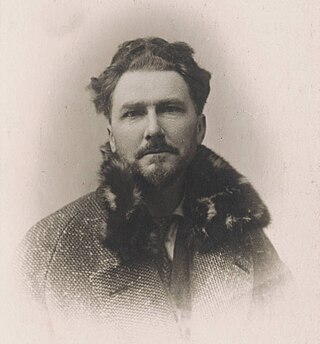
Fascism is a far-right, authoritarian, and ultranationalist political ideology and movement, characterized by a dictatorial leader, centralized autocracy, militarism, forcible suppression of opposition, belief in a natural social hierarchy, subordination of individual interests for the perceived good of the nation or race, and strong regimentation of society and the economy. Opposed to anarchism, democracy, pluralism, egalitarianism, liberalism, socialism, and Marxism, fascism is at the far right of the traditional left–right spectrum.

Ezra Weston Loomis Pound was an American poet and critic, a major figure in the early modernist poetry movement, and a collaborator in Fascist Italy and the Salò Republic during World War II. His works include Ripostes (1912), Hugh Selwyn Mauberley (1920), and his 800-page epic poem The Cantos.

Imagism was a movement in early-20th-century poetry that favored precision of imagery and clear, sharp language. It is considered to be the first organized modernist literary movement in the English language. Imagism has been termed "a succession of creative moments" rather than a continuous or sustained period of development. The French academic René Taupin remarked that "it is more accurate to consider Imagism not as a doctrine, nor even as a poetic school, but as the association of a few poets who were for a certain time in agreement on a small number of important principles".

"The Doctrine of Fascism" is an essay attributed to Benito Mussolini. In truth, the first part of the essay, entitled "Idee Fondamentali", was written by the Italian philosopher Giovanni Gentile, while only the second part "Dottrina politica e sociale" is the work of Mussolini himself.

The Cantos is a long modernist poem by Ezra Pound, written in 109 canonical sections in addition to a number of drafts and fragments added as a supplement at the request of the poem's American publisher, James Laughlin. Most of it was written between 1915 and 1962, although much of the material in the first three cantos was abandoned or redistributed in 1923, when Pound prepared the first instalment of the poem, A Draft of XVI Cantos. It is a book-length work, widely considered to present formidable difficulties to the reader. Strong claims have been made for it as the most significant work of modernist poetry of the twentieth century. As in Pound's prose writing, the themes of economics, governance and culture are integral to its content.

Dorothy Shakespear was an English artist. She was the daughter of novelist Olivia Shakespear and the wife of American poet Ezra Pound. One of a small number of women vorticist painters, her art work was published in BLAST, the short-lived but influential literary magazine.

Olga Rudge was an American-born concert violinist, now mainly remembered as the long-time mistress of the poet Ezra Pound, by whom she had a daughter, Mary.

The history of fascist ideology is long and it draws on many sources. Fascists took inspiration from sources as ancient as the Spartans for their focus on racial purity and their emphasis on rule by an élite minority. Researchers have also seen links between fascism and the ideals of Plato, though there are key differences between the two. Italian Fascism styled itself as the ideological successor to Ancient Rome, particularly the Roman Empire. Georg Wilhelm Friedrich Hegel's view on the absolute authority of the state also strongly influenced fascist thinking. The 1789 French Revolution was a major influence insofar as the Nazis saw themselves as fighting back against many of the ideas which it brought to prominence, especially liberalism, liberal democracy and racial equality, whereas on the other hand, fascism drew heavily on the revolutionary ideal of nationalism. The prejudice of a "high and noble" Aryan culture as opposed to a "parasitic" Semitic culture was core to Nazi racial views, while other early forms of fascism concerned themselves with non-racialized conceptions of their respective nations.

Mary de Rachewiltz is an Italian-American poet and translator. She is the daughter of the American poet Ezra Pound, whose The Cantos she translated into Italian. Her childhood memoir Discretions was published in 1971.

Italian fascism, also classical fascism and Fascism, is the original fascist ideology, which Giovanni Gentile and Benito Mussolini developed in Italy. The ideology of Italian Fascism is associated with a series of political parties led by Mussolini: the National Fascist Party (PNF), which governed the Kingdom of Italy from 1922 until 1943, and the Republican Fascist Party (PFR), which governed the Italian Social Republic from 1943 to 1945. Italian fascism also is associated with the post–war Italian Social Movement (MSI) and later Italian neo-fascist political organisations.
Il Popolo d'Italia was an Italian newspaper published from 15 November 1914 until 24 July 1943. It was founded by Benito Mussolini as a pro-war newspaper during World War I, and it later became the main newspaper of the Fascist movement in Italy after the war. It published editions every day with the exception of Mondays.

The National Fascist Party was a political party in Italy, created by Benito Mussolini as the political expression of Italian fascism and as a reorganisation of the previous Italian Fasces of Combat. The party ruled the Kingdom of Italy from 1922 when Fascists took power with the March on Rome until the fall of the Fascist regime in 1943, when Mussolini was deposed by the Grand Council of Fascism. The National Fascist Party was succeeded by the Republican Fascist Party in the territories under the control of the Italian Social Republic, and it was ultimately dissolved at the end of World War II.

Fascist movements in Europe were the set of various fascist ideologies which were practiced by governments and political organizations in Europe during the 20th century. Fascism was born in Italy following World War I, and other fascist movements, influenced by Italian Fascism, subsequently emerged across Europe. Among the political doctrines which are identified as ideological origins of fascism in Europe are the combining of a traditional national unity and revolutionary anti-democratic rhetoric which was espoused by the integral nationalist Charles Maurras and the revolutionary syndicalist Georges Sorel.
Propaganda in Fascist Italy was used by the National Fascist Party in the years leading up to and during Benito Mussolini's leadership of the Kingdom of Italy from 1922 to 1943, and was a crucial instrument for acquiring and maintaining power and the implementation of Fascist policies.

Italian nationalism is a movement which believes that the Italians are a nation with a single homogeneous identity, and therefrom seeks to promote the cultural unity of Italy as a country. From an Italian nationalist perspective, Italianness is defined as claiming cultural and ethnic descent from the Latins, an Italic tribe which originally dwelt in Latium and came to dominate the Italian peninsula and much of Europe. Because of that, Italian nationalism has also historically adhered to imperialist theories. The romantic version of such views is known as Italian patriotism, while their integral version is known as Italian fascism.

A Lume Spento is a 1908 poetry collection by Ezra Pound. Self-published in Venice, it was his first collection.

Fascist Italy is a term which is used in historiography to describe the Kingdom of Italy when it was governed by the National Fascist Party from 1922 to 1943 with Benito Mussolini as prime minister and dictator. The Italian Fascists imposed totalitarian rule and crushed political opposition, while simultaneously promoting economic modernization, traditional social values and a rapprochement with the Roman Catholic Church.

The expatriate American poet Ezra Pound recorded or composed hundreds of broadcasts in support of fascism for Italian radio during World War II and the Holocaust in Italy. Based in Italy since 1924, Pound collaborated with the fascist regime of Benito Mussolini and expressed support for Adolf Hitler. Written at first for EIAR, and later for a new radio station in the Salò Republic, a Nazi puppet state in northern Italy, the broadcasts contained deeply antisemitic and racist material. They were transmitted to England, central Europe, and the United States, mostly in English, but also in Italian, German, and French.

If This Be Treason ... is a 33-page booklet published privately in Italy in early 1948 by Olga Rudge, mistress of the American poet Ezra Pound. Pound, who lived in Italy with his wife from 1924 to 1945, was indicted in absentia for treason in 1943 by the United States District Court for the District of Columbia after he made hundreds of radio broadcasts, pro-Axis and deeply antisemitic, on behalf of Fascist Italy during World War II and the Holocaust in Italy. The title phrase had previously been used in a speech by Patrick Henry in 1765.

Guide to Kulchur is a non-fiction book by the American poet Ezra Pound. Published in London in July 1938 by Faber & Faber, the book examines 2,500 years of cultural history, beginning with the Analects of Confucius. The first chapter was published in Milan in June 1937 as a pamphlet, Confucius/Digest of the Analects, by Giovanni Scheiwiller.
















